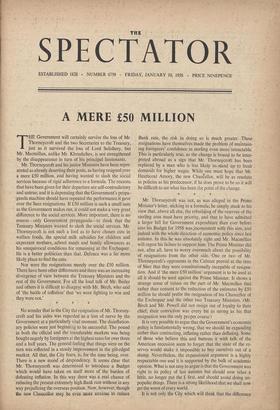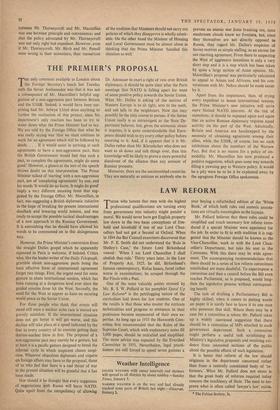A MERE £50 MILLION
THE Government will certainly survive the loss of Mr. Thorneycroft and the two Secretaries to the Treasury, just as it survived the loss of Lord Salisbury, but Mr. Macmillan, unlike Mr. Khrushchev, is not strengthened by the disappearance in turn of his principal lieutenants.
Mr. Thorneycroft and his junior Ministers have been repre- sented as abrutly deserting their posts, as having resigned over a mere £50 million, and having wanted to slash the social services because of rigid adherence to a formula. The reasons that have been given for their departure are self-contradictory and untrue; and it is depressing that the Government's propa- ganda machine should have repeated the performance it gave over the Suez resignations. If £50 million is such a small sum as the Government makes out, it could not make a very great. difference to the social services. More important, there is no reason—only Government propaganda—to think that the Treasury Ministers wanted to slash the social services. Mr. Thorneycroft is not such a fool as to have chosen cuts in welfare foods, the special milk subsidies for children and .expectant mothers, school meals and family allowances as his unequivocal conditions for remaining at the Exchequer. He is a better politician than that. Defence was a far more likely place to find the cuts.
Nor were the resignations merely over the £50 million. There have been other differences and there was an increasing divergence of view between the Treasury Ministers and the rest of the Government. For all the loud talk of Mr. Butler and others it is difficult to disagree with Mr. Birch, who said of 'the battle of inflation' that 'we were fighting to win and they were not.' * * No wonder that in the City the resignation of Mr. Thorney- croft and his aides was regarded• as a loss of nerve by the Government at a particularly vital moment. The disinflation- ary policies were just beginning to be successful. The pound in both the official and the transferable markets was being bought eagerly by foreigners at the highest rates for over three and a half years. The general feeling that things were on the turn was reflected in a steady improvement in the gilt-edged market. All that, the City fea`rs, is, for the time being, over. There is a new mood of despondency. It seems clear that Mr. Thorneycroft was determined to introduce a Budget which would have taken on itself more of the burden of defeating inflation. In this way there was a real chance of reducing the present extremely high Bank rate without in any way prejudicing the overseas position. Now, however, though the new Chancellor way be even more anxious to reduce Bank rate, the risk in doing so is much greater. These resignations have themselves made the problem of maintain- ing foreigners' confidence in sterling even more intractable. This is particularly true, as the change is bound to be inter- preted abroad as a sign that Mr. Thorneycroft has been replaced by a man who is less likely to stand up to fresh demands for higher wages. While one must hope that Mr. Heathcoat Amory, the new Chantellor, will be as resolute in policies as his predecessor, if he does prove to be so it will be difficult to see what has been the point of the change.
Mr. Thorneycroft was not, as was alleged in the Prime Minister's letter, sticking to a formula; he simply stuck to his view that, above all else, the rebuilding of the reserves of the sterling area must _have priority, and that to have admitted a larger bill for Government expenditure than ever before into his Budget for 1958 was.inconsistent with this aim, and indeed with the whole direction of economic policy since last autumn. In this he was absolutely right and Mr. Macmillan will regret his failure to support him. The Prime Minister did not, after all, have to worry overmuch about the possibility of resignations from the other side. One or two of Mr. Thorneycroft's opponents in the Cabinet proved at the time of Suez that they were constitutionally incapable of resigna- tion. And if 'the mere £50 million' argument is to be used at all it should be used against the Prime Minister. It shows a strange sense of values on the part of Mr. Macmillan that rather than consent to the reduction of the estimates by £50 million he should prefer the resignation of his Chancellor of the Exchequer and the other two Treasury Ministers. .(Mr. Birch and Mr. Powell did not resign out of loyalty to their chief; their conviction was every bit as strong as his that resignation was the only proper course.) It is very possible to argue that the Government's economic policy is fundamentally wrong, that we should be expanding rather than contracting, inflating rather than deflating. Some of those who believe this and buttress it with talk of the American recession seem to forget that the state of the re- serves would make it impossible to buy ourselves out of a slump. Nevertheless, the expansionist argument is a highly respectable one and it is supported by the bulk of academic opinion. What is not easy to argue is that the Government was right in its policy of last autumn but should now relax a little, no longer put the £ first, and should avoid doing un- popular. things. There is a strong likelihood that we shall now get the worst of every world.
It is not only the City which will think that the difference
between Mr. Thorneycroft and Mr. Macmillan was one between principle and convenience; and that the policy advocated by Mr. Thorneycroft was not only right but expedient. However, even if Mr. Thorneycroft, Mr. Birch and Mr. Powell were wrong in their economics, their reassertion of the tradition that Ministers should not carry out policies of which they disapprove is wholly admir- able. On the other hand the Minister of Housing and Local Government must be almost alone in thinking that the Prime Minister 'handled this situation so well.'



































 Previous page
Previous page